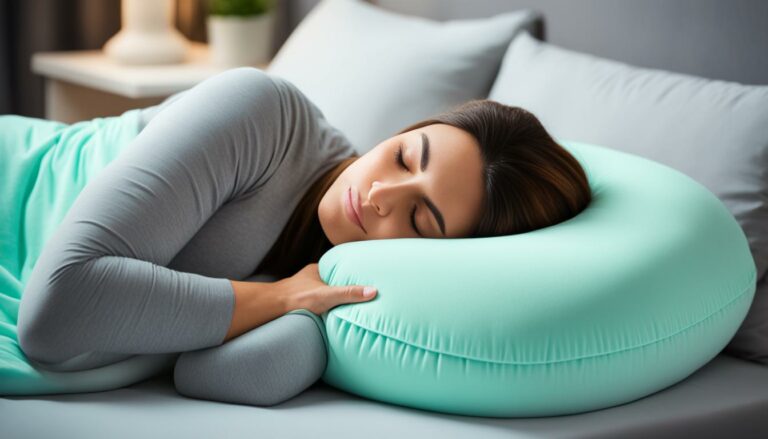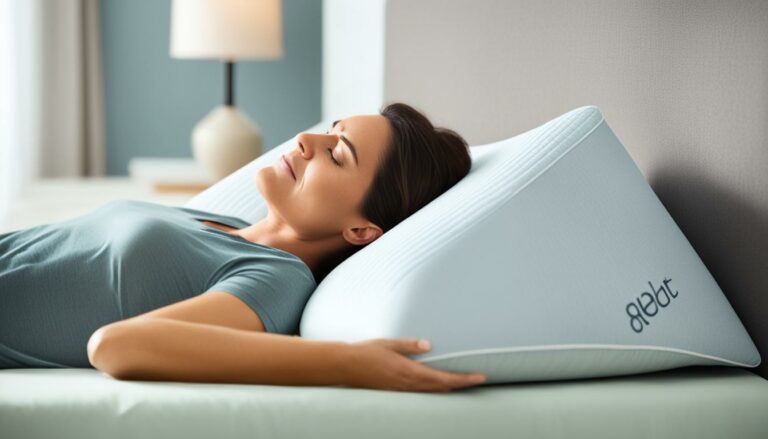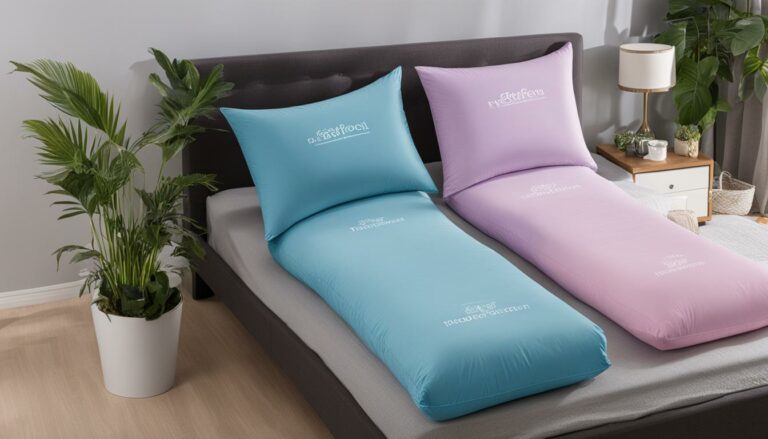Maximize Comfort: How to Use a Wedge Pillow
Eric Christie stands as a luminary in the bedding industry, with a career spanning nearly four decades since the early 1980s. His journey through the world of bedding has seen him wear many hats – a manufacturer, designer, and retailer, showcasing his versatility and expertise in Read more...
pillowsandbedsheets.com and its partners may earn a commission if you purchase a product through one of our links
A wedge pillow is a versatile bedding accessory that can significantly enhance your sleep experience. Whether you’re looking to alleviate snoring, acid reflux, back pain, or simply improve your sleep posture, a wedge pillow can be a game-changer. In this article, we will explore the various ways to use a wedge pillow and how it can benefit your overall sleep quality and comfort.
Key Takeaways:
- Using a wedge pillow can provide relief from snoring, acid reflux, and back pain.
- There are different sleeping positions that you can try with a wedge pillow to maximize its benefits.
- Choosing the right wedge pillow and adjusting it to your personal preferences is crucial.
- A wedge pillow is an affordable alternative to adjustable beds and can improve your overall sleep quality.
- Consider your specific needs and conditions when selecting a wedge pillow.
What is a Wedge Pillow?
A wedge pillow is a triangular-shaped orthopedic pillow with a tapered incline. It is designed to lift the upper body or legs at a 30 to 45-degree angle, providing support and relief from various conditions.
Most wedge pillows measure between 20 and 25 inches wide and long. They are commonly made from firm memory foam or polyurethane foam for optimal comfort and support.
Key Features of a Wedge Pillow:
| Shape | Incline | Size | Material |
|---|---|---|---|
| Triangular | 30 to 45 degrees | 20 to 25 inches wide and long | Firm memory foam or polyurethane foam |
“A wedge pillow is a simple yet effective solution for improving sleep quality and addressing various health issues. Its unique shape and incline provide targeted support and elevation, allowing you to find relief and enhance your overall comfort during sleep.”
Whether you suffer from snoring, sleep apnea, acid reflux, or discomfort due to poor circulation or back pain, a wedge pillow can be a game-changer. Its versatile design allows for multiple sleeping positions and provides the necessary support to align your body properly while you rest. Its compact size and durable materials make it a cost-effective alternative to adjustable beds.
Next, we will explore how to use a wedge pillow in specific sleeping positions to maximize its benefits and improve your sleep quality.
Upright Recline
An upright recline position can be achieved by placing the wide end of the wedge pillow flat on the mattress and resting the flat side against the wall or headboard. This position is ideal for activities like reading or journaling in bed, as it provides support to the upper body without straining the neck or upper back. The best wedge pillows for sitting up in bed have a higher incline of around 43 to 45 degrees.
Benefits of Upright Recline Position
- Allows you to sit up comfortably in bed and perform activities such as reading, writing, or using a laptop.
- Provides support to the upper body, reducing strain on the neck and upper back.
- Enhances posture by promoting a more upright position.
- Helps alleviate symptoms of acid reflux by keeping the upper body elevated.
- Improves circulation by preventing blood pooling in the legs.
“I love using the upright recline position with my wedge pillow. It’s perfect for reading my favorite books in bed without straining my neck. Highly recommended!” – Sarah, Wedge Pillow User
| Features | Benefits |
|---|---|
| Higher incline (43 to 45 degrees) | Provides optimal support and comfort for sitting up in bed. |
| Wide end for stability | Ensures the wedge pillow stays in place against the wall or headboard. |
| Designed for upper body support | Reduces strain on the neck and upper back while sitting up in bed. |
| Durable materials | Made from high-quality foam for long-lasting support and comfort. |
Elevated Back Sleeping
Elevating your upper body while sleeping on your back can provide relief for common nighttime issues such as snoring, sleep apnea, and acid reflux. By using a wedge pillow specifically designed for these purposes, you can optimize your sleeping position and improve your overall sleep quality.
To achieve the desired elevation, place the thinnest part of the wedge pillow near the middle of your back and rest your upper body on the incline. This position helps open up the airway, preventing the tongue from falling backward, and reducing the symptoms associated with snoring, sleep apnea, and acid reflux.
The recommended incline for a wedge pillow suitable for snoring, sleep apnea, or acid reflux is between 35 and 45 degrees. Additionally, the pillow should provide an elevation of 8 to 10 inches. This combination ensures optimal support and alignment for your upper body during sleep.

| Benefits of Elevated Back Sleeping | How to Achieve It |
|---|---|
| Reduces snoring | Place the wedge pillow beneath your upper body with the thinnest part near the middle of your back |
| Alleviates sleep apnea symptoms | Ensure the incline and elevation of the wedge pillow meet the recommended ranges |
| Relieves acid reflux symptoms | Rest your upper body on the wedge pillow’s incline, creating an optimal angle for digestion |
Elevated Side Sleeping
A wedge pillow can also be a game-changer when it comes to side sleeping. By using a wedge pillow, you can alleviate sleep apnea, acid reflux, and provide much-needed support to your body.
When using a wedge pillow for side sleeping, it’s crucial to find the right incline. Aim for an angle of 35 to 45 degrees to ensure optimal support and comfort. Additionally, consider adjusting where your head rests on the pillow by sitting higher or lower. This adjustment allows you to maintain proper alignment of the head, neck, and shoulders, reducing tension in the back muscles.
To enhance the benefits of side sleeping with a wedge pillow, opt for a memory foam pillow with a medium to medium-firm feel. This type of pillow is designed to cradle your shoulders, preventing pressure points and providing the support you need for an uninterrupted night’s sleep.
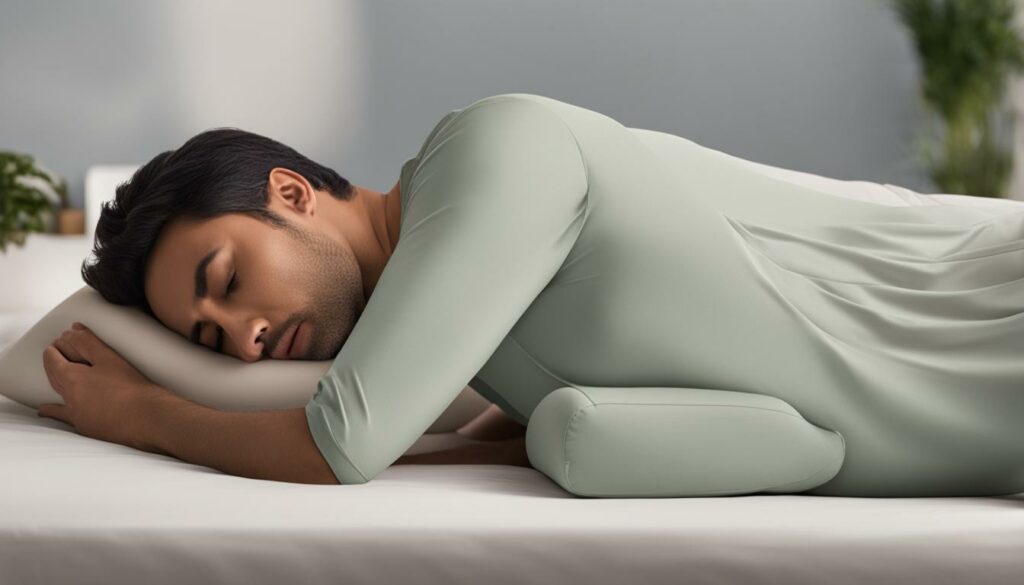
Benefits of Elevated Side Sleeping with a Wedge Pillow:
- Alleviates sleep apnea and acid reflux
- Provides support for proper alignment of the head, neck, and shoulders
- Reduces tension in the back muscles
- Prevents pressure points and discomfort
By incorporating a wedge pillow into your side sleeping routine, you can say goodbye to sleep apnea, acid reflux, and wake up feeling refreshed and revitalized.
Leg Articulation When Back Sleeping
When it comes to sleeping on your back, back sleepers can enhance their comfort and promote better posture by using a wedge pillow for leg articulation. Placing a wedge pillow under your knees while lying on your back helps relieve pressure on the lower back and promotes relaxation of the muscles.
This position not only eases tension in the lower back but also increases blood circulation, preventing swelling and varicose veins. For individuals with heart disease or other medical conditions, this leg articulation technique can provide additional benefits to improve overall health.
Using a wedge pillow for leg articulation while back sleeping is a simple yet effective way to optimize your sleep experience. By elevating the knees, you can take strain off the lower back and allow for better blood flow throughout your body.
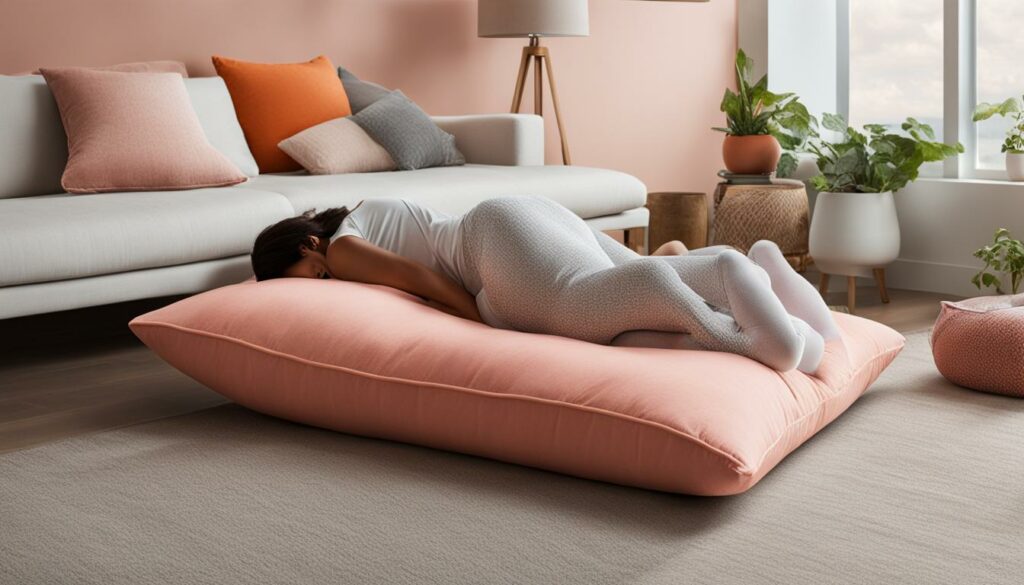
So why not give it a try? Place a wedge pillow beneath your knees when you sleep on your back and experience the difference in your sleep quality and overall well-being.
Lap Placement
A wedge pillow can be a versatile solution for working or using a laptop or tablet in bed. It can serve as a convenient mini desk, providing a stable surface for your device. To achieve lap placement with a wedge pillow, follow these steps:
- Place the wedge pillow on your lap with the thinnest part resting on your lap.
- Ensure that the widest part of the wedge pillow is positioned near your knees.
This configuration creates a practical and ergonomic workspace right from the comfort of your bed. You can prevent wrist strain and maintain a comfortable position while accessing your laptop or tablet.
Here’s an example of how lap placement with a wedge pillow looks:
 |
Lap Placement with a Wedge Pillow |
|---|
Lap placement with a wedge pillow offers the convenience of working or using your devices in a relaxed position while avoiding discomfort or strain.
Benefits of Using a Wedge Pillow
Using a wedge pillow offers several benefits. It can improve sleep quality by reducing snoring, sleep apnea, and acid reflux symptoms. It can also alleviate back pain, promote better circulation, and provide support for pregnant women.
Wedge pillows are affordable and widely available, making them a convenient option for those seeking relief. They can be a cost-effective alternative to adjustable beds, offering similar benefits without the high price tag.
These pillows are durable and made from high-quality materials such as memory foam or polyurethane foam, ensuring comfort and longevity. The memory foam contour of the wedge pillow provides excellent support and conforms to the body’s natural shape.
Here are a few key benefits of using a wedge pillow:
| Benefits | Description |
|---|---|
| Improved sleep quality | Reduces snoring, sleep apnea, and acid reflux symptoms |
| Alleviates back pain | Provides support and relieves pressure on the lower back |
| Promotes better circulation | Elevating the legs helps improve blood flow and reduces swelling |
| Support for pregnant women | Helps relieve pressure on the abdomen and provides support for optimal sleep positions |
| Cost-effective alternative | Offers similar benefits to adjustable beds at a fraction of the cost |
| Durable and high-quality | Made from memory foam or polyurethane foam for long-lasting comfort |
In addition to these benefits, wedge pillows can also be used for various sleeping positions, providing versatility and customizable support. The incline of the pillow allows for a comfortable and ergonomic sleep experience, minimizing discomfort and promoting proper alignment of the body.
Now that you understand the benefits of using a wedge pillow, it’s time to explore different ways to incorporate it into your sleep routine. Whether you suffer from snoring, acid reflux, back pain, or poor circulation, a wedge pillow can be a valuable addition to maximize your comfort and improve your overall sleep quality.
Frequently Asked Questions about Wedge Pillows
Got questions about wedge pillows? We’ve got you covered. Here are some frequently asked questions to help you understand everything you need to know:
- How high should you raise your bed for GERD?
- Does sleeping on an incline stop snoring?
- Do you use a regular pillow with a wedge pillow?
- Are thick pillows bad for your neck?
- Is sleeping on your stomach bad?
If you’re looking to ease symptoms of GERD (gastroesophageal reflux disease), it’s recommended to raise the head of your bed by 6 to 8 inches. A wedge pillow can provide the necessary elevation to help reduce acid reflux and promote better sleep.
Yes, sleeping on an incline can help alleviate snoring. By using a wedge pillow or elevating the head of your bed, you can open up the airways and reduce snoring. This position helps keep the tongue in place, preventing it from blocking the airway and causing snoring.
Yes, you can use a regular pillow with a wedge pillow. Depending on your comfort preferences, you may choose to use a regular pillow for added support or to adjust the height of your head and neck.
Thick pillows can be bad for your neck, as they may cause improper alignment during sleep. It’s important to choose a pillow that provides proper support for your neck and maintains a neutral position while you sleep. A wedge pillow with a gradual incline can help alleviate neck pain and promote better spinal alignment.
Yes, sleeping on your stomach can strain your neck and spine. It can cause undue pressure on your joints and lead to discomfort and pain. It’s recommended to avoid sleeping on your stomach and opt for side or back sleeping positions with the support of a wedge pillow.
Are you ready to start using a wedge pillow? Discover the benefits it can bring to your sleep and overall well-being.
| Question | Answer |
|---|---|
| How high should you raise your bed for GERD? | It’s recommended to raise the head of your bed by 6 to 8 inches to alleviate symptoms of GERD. |
| Does sleeping on an incline stop snoring? | Sleeping on an incline can help reduce snoring by opening up the airways and keeping the tongue in place. |
| Do you use a regular pillow with a wedge pillow? | Yes, you can use a regular pillow with a wedge pillow to enhance support and adjust height. |
| Are thick pillows bad for your neck? | Thick pillows can cause improper neck alignment, so it’s important to choose a supportive pillow. |
| Is sleeping on your stomach bad? | Sleeping on your stomach can strain your neck and spine, so it’s best to avoid this position. |
Are You Ready to Start Using a Wedge Pillow?
Elevating your head and legs during sleep can bring about numerous benefits, such as improved sleep quality and relief from various conditions. Wedge pillows offer an affordable, effective solution that is widely accessible. Whether you experience snoring, sleep apnea, acid reflux, back pain, or poor circulation, incorporating a wedge pillow into your sleep routine can be a valuable addition. By considering the different ways to use a wedge pillow, which we have discussed in this article, you can find the position that best suits your needs.
Conclusion
In conclusion, using a wedge pillow can greatly enhance your comfort and improve the quality of your sleep. By understanding how to properly use a wedge pillow in different sleeping positions and for various conditions, you can maximize its benefits and promote healthier sleep habits. Remember to choose a wedge pillow that fits your desired incline and size, and adjust it according to your personal preferences.
With its versatile design and proper usage, a wedge pillow can serve as a valuable tool to improve your sleep posture and overall sleep quality. Whether you are looking to alleviate snoring, sleep apnea, acid reflux, back pain, or simply enjoy a more restful sleep, a wedge pillow can be a cost-effective alternative to adjustable beds.
Investing in a high-quality wedge pillow made from durable materials like memory foam or polyurethane foam can provide you with long-lasting comfort and support for years to come. So why wait? Start using a wedge pillow today and experience the many benefits it has to offer for a better night’s sleep.
FAQ
How high should you raise your bed for GERD?
It is recommended to elevate your upper body at a 30 to 45-degree angle by using a wedge pillow.
Does sleeping on an incline stop snoring?
Sleeping on an incline with a wedge pillow can help reduce snoring by opening up the airway and preventing the tongue from falling backward.
Do you use a regular pillow with a wedge pillow?
It is not necessary to use a regular pillow with a wedge pillow as it provides sufficient support on its own.
Are thick pillows bad for your neck?
Thick pillows can put strain on your neck and cause discomfort. It’s important to find a pillow that provides proper support and alignment for your neck.
Is sleeping on your stomach bad?
Sleeping on your stomach can strain your neck and spine. It is recommended to sleep on your side or back for better alignment and comfort.
Are you ready to start using a wedge pillow?
If you are experiencing snoring, acid reflux, back pain, or other related conditions, using a wedge pillow can be a beneficial addition to your sleep routine.
Eric Christie stands as a luminary in the bedding industry, with a career spanning nearly four decades since the early 1980s. His journey through the world of bedding has seen him wear many hats – a manufacturer, designer, and retailer, showcasing his versatility and expertise in Read more...


